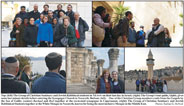Jesus, Judaism and Seeing the Other
By Rachael McNeal and Rori Picker Neiss

|
|
How should Christians and Jews relate to the Jewishness of Jesus? That is the question we kept returning to throughout our interfaith trip across Israel and the Palestinian territories.
We are an unlikely pair of female religious leaders: a recent evangelical graduate of Princeton Theological Seminary, and an Orthodox Jewish student in a religious leadership training program in NYC. We were brought together by Auburn Seminary and AJC in a travel-learning seminar in Israel and the Palestinian territories.
Highlights of the trip included Jerusalem holy sites like the Church of the Holy Sepulchre (where many believe Jesus was crucified and buried), the Temple Mount, and the Kotel/Western Wall; the Sea of Galilee and the Golan; Yad VaShem (Holocaust Museum); Bethlehem, and the 20-foot concrete barrier that separates it from Jerusalem; Rachel's Tomb and the Church of the Nativity; Aida Refugee Camp; the Alon Shevut settlement; family visits with Israeli Jewish and Palestinian families, and more. We spoke with Israeli Jews and Arabs, Palestinians, politicians, negotiators, security experts, journalists, academics and religious leaders from the Jewish, Christian and Muslim communities. On top of it all, our group engaged in our own deep, transformative dialogue.
Of all of the places we visited, it was at Capernaum, an ancient fishing village on the Sea of Galilee, that we - a Jew and a Christian- came to a shared realization: Jesus' Jewishness is central to understanding him as a historical person and to how he understood himself and the world around him. There we gathered at the ruins of an excavated synagogue and read the Gospel story in the first chapter of Mark of Jesus preaching in a Capernaum synagogue. Archaeologists told us that the ruins were too young to have been the same synagogue where Jesus preached, but we didn't care. We wandered through the excavations of this ancient Jewish fishing village and imagined Jesus teaching there. We imagined Jesus' disciples going about their daily routines. Together we saw Simon Peter, Andrew, James, and John as they laughed with their neighbors, ate Shabbat dinner with their families, studied Torah, and shared the words of Jesus. In Capernaum, the Jewishness of Jesus truly came alive for us.
Uncovering the Jewishness of Jesus wasn't groundbreaking or revelatory for us; we both knew before this trip that Jesus was a first-century Jew. Yet there was a kind of revelation: not about who Jesus was, but about who we are, as Christian and Jew. We didn't forget our differences about how we understand the God of Israel and the Modern State of Israel. But there, at Capernaum, we - a Christian and a Jew - experienced a piece of our shared history. In that moment we were able to move beyond the differences, the barriers, and the centuries of conflict and misunderstanding. Call it a moment, a realization, a revelation, or a switch that went on and can't be turned off. We saw through each other's eyes, and saw ourselves anew.
Despite all of the questions and confusion we gained from our trip, despite all of the painful stories, complex politics, unfathomable fear, and countless offenses, it is the ability to both feel and appreciate our shared history, as well as the ability to experience the world through each other's eyes, that gives us our single piece of clarity: for us to live more peacefully, we must challenge ourselves to be willing to stand in one another's shoes and to see the world as the other sees it.
As young religious leaders we understand that theologically, for Christians and Jews, Israel is important. Many Christians know Israel as the place where Jesus walked. Many Jews know Israel as the Promised Land and homeland. We challenge our fellow Christians and Jews to understand Israel even more deeply, and more complexly. Jews who visit Israel can strive to see the holiness in the land that is shared by so many people. Christians who visit Israel can strive to see a modern state carrying with it the dangers and challenges of our modern world. In order for peace to take root, Americans, Israelis and Palestinians must build face-to-face relationships, crossing lines of faith, culture, race, and language, to see the divine - and themselves - in the face of the Other.
* * *
Rachael McNeal, a recent graduate of Princeton Theological Seminary, is the Interfaith Coordinator at the University of North Florida's Interfaith Center in Jacksonville, Fl, and adjunct professor of Old Testament/Hebrew Bible at Flagler College in St. Augustine, FL.
Rori Picker Neiss is a student at Yeshivat Maharat, a pioneering institution training Orthodox Jewish women to be spiritual leaders and halakhic (Jewish legal) authorities. She is the North American Representative to the Religions for Peace Global Youth Network, a member of the board of the Young Leadership Council of the International Council of Christians and Jews, and co-editor of InterActive Faith: The Essential Interreligious Community-Building Handbook.
